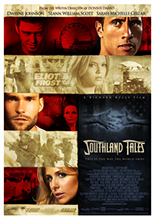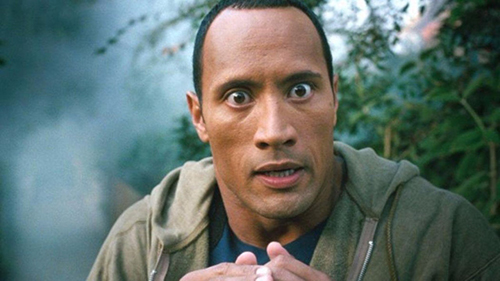
 I am not a fan of Donnie Darko, director Richard Kelly’s debut feature film. When I originally went into his follow-up, Southland Tales, well over a decade ago, I felt mostly the same way about Dwayne Johnson, Sarah Michelle Gellar and Seann William Scott as they ran all over Los Angeles on a drug-fueled It’s a Mad, Mad, Mad, Mad World low-riding cruise.
I am not a fan of Donnie Darko, director Richard Kelly’s debut feature film. When I originally went into his follow-up, Southland Tales, well over a decade ago, I felt mostly the same way about Dwayne Johnson, Sarah Michelle Gellar and Seann William Scott as they ran all over Los Angeles on a drug-fueled It’s a Mad, Mad, Mad, Mad World low-riding cruise.
I walked out about an hour in.
Flash-forward many years later: Watching with far more of a (now) mature mind, I can see what Kelly — by accident or otherwise — was not only trying to do, but ultimately succeeded in: a near rewrite of the end of the world, with a heavy — and welcomed — emphasis on biblical allusions. Does a lot of it make sense? Not really, but I wouldn’t expect the apocalypse to, anyway.
Taking place in the then-futuristic landscape of 2008, society is much like it is now: a world of consumerism and lust ready to crumble upon itself. Boxer Santaros (Johnson) is an amnesiac who somehow hooks up with porn actress Krysta Now (Gellar) to collaborate on a screenplay entitled The Power.
Meanwhile, after a devastating nuclear attack on Abilene, Texas, a strange German corporation led by strange actor Wallace Shawn invents a new energy source called Fluid Karma that has, for the most part, put the Eastern part of the U.S. under its control, along with a nightmarish form of surveillance called USIdent.
Meanwhile meanwhile, as Shawn and crew plan for the next phase of their literal lower grab, a police officer (Sean William Scott) has apparently been split into two people sharing the same soul, each half looking for the other — a meeting that will cause time to collapse.
Again, does it make much sense? Not at first glance and, really, that’s probably what turned movie audiences off. But, especially with the help of drug-addled (and wholly grating) soldier Justin Timbelake’s biblically-based narrations, it becomes obvious that Kelly is rewriting the Book of Revelation for a crowd who, for the most part, no longer believes in the Bible or, sadly, the end of the world.
As time marches on, Southland Tales plays far more prescient now than ever before. —Louis Fowler

